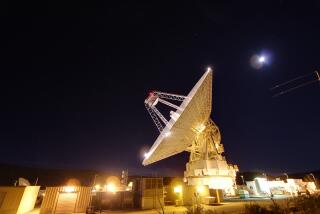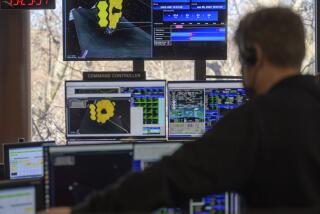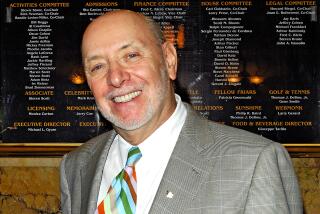Lawrence Kitchen dies at 90; Lockheed head dominated aerospace industry
Lawrence O. Kitchen, the business-savvy ex-Marine who ran Lockheed Corp. in an era when the aerospace industry was dominated by scientists and engineers, died Sunday in Woodland Hills of neurological complications. He was 90.
Kitchen is credited with turning around Lockheed’s troubled operation in Georgia as a young executive, saving the C-5 Galaxy cargo jet program. Years later, he outmaneuvered competitors by persuading the Reagan administration to buy 100 more of the planes, a task that kept him personally lobbying Congress for a stretch of seven months.
Although he lacked a high level scientific background and never graduated from a four-year college, Kitchen had an instinct for investing in the right technology. He put company money into stealth programs, leading to the then-secret contract to build the F-117 stealth attack jet in Burbank.
Kitchen made bold business moves, including an early start on consolidation in the aerospace industry when he purchased Sanders Associates, a New Hampshire-based defense electronics company.
But most of all Kitchen was known for blunt talking, challenging his executives in tough terms but also publicly standing up to the Defense Department’s sometimes radical demands during the 1980s political controversies.
“He was forthright,” recalled Daniel Tellep, who succeeded Kitchen as Lockheed’s chief executive. “Once people got to know him, they liked that. There was not much ambiguity about how he felt.”
One of Kitchen’s biggest peeves was the allegation that the company had charged the Pentagon $640.99 for spare toilet seats for its P-3 Orion submarine hunting aircraft.
Kitchen was annoyed, because the price included Lockheed’s standard overhead charges that were a normal part of every deal. He agreed to reduce the price and then later ordered his subordinates to give away free spare parts to avoid further allegations.
“We have actually given away parts just to keep from screwing around with the paperwork,” Kitchen told The Times in 1984. “We just bundle it up and ship it.… We are doing that to avoid these horror” stories.
And when Lockheed was accused by Pentagon officials two years later of inflating the production costs of the C-5B by $500 million, Kitchen said the allegations were “totally lacking merit.... Lockheed intends to dispute any claim the Air Force may assert and is confident that it will prevail.” In the end, Kitchen was right.
While he attempted to protect his company from outside critics, he also was faced with a bloated corporate structure that he was forced to trim back. As the end of the Cold War approached, Kitchen consolidated research operations at three of the company’s far-flung aeronautics units and set up the process for even greater cutbacks.
When Kitchen was promoted to president of the company in 1976, he jumped into an oven. The company was battling allegations that its previous management had bribed foreign officials, a scandal that led to the fall of Japanese Prime Minister Kakuei Tanaka. And within months, the company was accused of losing 1,400 secret documents, forcing Kitchen to admit in a congressional hearing that the company’s practices had been “inexcusable.” But Kitchen and his boss, Roy Anderson, were credited with stabilizing the company and bringing a new emphasis on integrity. In 1986, Kitchen was named chairman and chief executive officer. He retired in 1988.
Brenda Kitchen, his wife of 35 years, described him as an honest and gentle person under a façade of corporate gruffness. “He was as good and smart and kind a person as you will find,” she said. In his retirement in Ventura County, Kitchen became devoted to animal rights.
“He would sing to his cats from the shower,” she said.
He did not rise through the ranks as most executives. Kitchen was born June 8, 1923, to a poor family in a small textile town in South Carolina, sharing a two-room house with his parents and five siblings. He left when he joined the Marine Corps in 1942 after the attack on Pearl Harbor. He was assigned to aviation technical school and ended up on a ground crew in the South Pacific, where he said he got aviation into his blood.
After the war, he went to Washington, D.C., and landed a civilian job at the Navy as a clerk typist. He attended night school, being promoted to a staff assistant at the service’s aeronautics bureau and, after 12 years of night study, was designated an aeronautical engineer by the civil service, he told The Times in an interview. He decided to flee Washington in 1958 after a snowstorm stranded him on the George Washington Parkway.
“I abandoned my car, walked home, got home about 9:30 and said, ‘Who needs this?’ ” he recalled. Not long after, he moved to Sunnyvale in Northern California and began working at Lockheed’s missile plant.
Kitchen is survived by his wife Brenda, two sisters, three children, six grandchildren and two great-grandsons.
More to Read
Start your day right
Sign up for Essential California for the L.A. Times biggest news, features and recommendations in your inbox six days a week.
You may occasionally receive promotional content from the Los Angeles Times.







